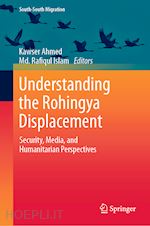
Questo prodotto usufruisce delle SPEDIZIONI GRATIS
selezionando l'opzione Corriere Veloce in fase di ordine.
Pagabile anche con Carta della cultura giovani e del merito, 18App Bonus Cultura e Carta del Docente
This book provides a focused and comprehensive understanding of the conflict surrounding the Rohingya displacement, using a unique peace and conflict transformation viewpoint. Divided into four sections and nineteen chapters, it covers significant themes related to the conflict. It provides an in-depth examination of its security implications, media impact, and the need for a long-term transformation strategy. The authors offer a sharp perspective on the crisis, covering a wide range of topics, including human rights abuses, geopolitics, media influence, and repatriation of the Rohingya. Each chapter focuses on a different aspect of the conflict, providing readers with a thorough understanding of the Rohingya displacement-related conflict. The authors advocate for a peaceful end to the conflict through repatriation, offering valuable conflict transformation tools for decision-makers in Bangladesh and around the world. This book is essential for anyone seeking a deeper understandingof the conflict's security implications and highlights original research from academics on the role of the media. It is relevant for scholars, politicians, decision-makers in the security and refugee management fields, academics studying the media, and humanitarian actors.
Chapter 1: Setting the Stage and Addressing Conceptual Issues.- Part I: Historical Context and Ethnic Identity.- Chapter 2: A History of Rohingya Displacement, Rohingya Ethnicity, and Contested Identity in Myanmar and Bangladesh.- Chapter 3: The Continuing History of Rohingya Settlement in Bangladesh.- Part II: Conflict Dynamics and Security Implications.- Chapter 4: Exploring Post-settlement Social Dynamics and Conflict Between the Host Community and Rohingyas.- Chapter 5: Rohingyas in Bangladesh: Economic and Environmental Conflict Potential.- Chapter 6: Rohingyas in Bangladesh: Regional and International Conflict Potential.- Chapter 7: Rohingyas in Bangladesh: Sociopolitical Conflict Potential.- Chapter 8: The Rohingya Crisis: Its Geopolitical Context and Security Ramifications.- Chapter 9: Military Coup d’état, State of Anarchy, and the Future of Ethnic Armed Resistance vis-à-vis Reconciliation in Myanmar.- Chapter 10: Crime and Securitization Conundrums in the Rohingya Camps.- Part III - Media Narratives and Propaganda in Conflict.- Chapter 11: Media, Propaganda, and the Othering Process of the Rohingyas.- Chapter 12: “Framing” the Rohingya Crisis: Mainstream Media Coverage and Shifting Narratives.- Part IV: Right to Return, Rehabilitation, Peacebuilding, and Camp Management.- Chapter 13: Displaced Rohingya Management in Bangladesh and Law Enforcement Agencies' Role.- Chapter 14: Social Cohesion and Integration of Rohingyas in the Host Community in Bangladesh.- Chapter 15: Repatriation of Rohingya Refugees: Prospects and Challenges.- Chapter 16: Updates on Rohingya Repatriation to Myanmar: The Tale of a Never-Ending Process.- Chapter 17: Rohingya Relocation to Bhasan Char Island: A Sustainability Assessment.- Chapter 18: Civic Education as Peacebuilding in the Rohingya Refugee Camps.- Chapter 19: Conclusion.
Kawser Ahmed is an adjunct Professor at University of Winnipeg (Political Science) and University of Manitoba (NRI). He received his PhD in Peace and Conflict Studies from University of Manitoba in 2017 and completed his Social Science and Humanities Research Council (SSHRC) of Canada’s post-doctoral fellowship at University of Winnipeg. He was an exchange officer with the Turkish Armed Forces (TSK), an observer-Peacekeeper to the United Nations Missions in Western Sahara (MINURSO), and an alumnus at the Near East South Asia Center for Strategic Studies (NESA) in Washington DC. He is associated with the Center for Defence and Security Studies (CDSS) as a research fellow and a member of the Writers Union of Canada. He leads a Winnipeg based not-for-profit organization named Conflict and Resilience Research Institute, Canada (CRRIC). His research interests are social conflict and peace building, radicalism and violent extremism prevention, and UN peacekeeping operations.
Md. Rafiqul Islam is a Professor at the Department of Peace and Conflict Studies, University of Dhaka, Bangladesh. He has a PhD from Flinders University, Australia, and his thesis was awarded the John Lewis Silver Medal in South Australia. He had previously completed his bachelor’s degree in political science and has a master’s and an MPhil in peace and conflict studies from the University of Dhaka, Bangladesh. He has also completed an MA degree in environmental security and peace from the University for Peace, Costa Rica. His primary research interests include climate change, migration, refugees, peace, conflict, and development. Dr. Islam also has a keen interest in global politics, security, and peace issues and has published 40 articles and chapters across several publications based globally. Dr. Islam is currently involved in research in the field of Rohingya issues and statelessness in the Bengali borderland. Dr. Islam’s first book on “Climate Change, Migration and Conflict in Bangladesh” was published in 2023 by Routledge.











Il sito utilizza cookie ed altri strumenti di tracciamento che raccolgono informazioni dal dispositivo dell’utente. Oltre ai cookie tecnici ed analitici aggregati, strettamente necessari per il funzionamento di questo sito web, previo consenso dell’utente possono essere installati cookie di profilazione e marketing e cookie dei social media. Cliccando su “Accetto tutti i cookie” saranno attivate tutte le categorie di cookie. Per accettare solo deterninate categorie di cookie, cliccare invece su “Impostazioni cookie”. Chiudendo il banner o continuando a navigare saranno installati solo cookie tecnici. Per maggiori dettagli, consultare la Cookie Policy.